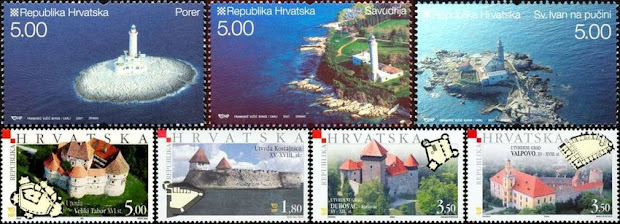In times of crisis, economic nationalism lies in wait. Governments around the world abuse taxpayers' money to support industries that were already in decline before the financial crisis arose. In order to save a countable number of jobs in established industries, governments waste uncountable amounts of money and destroy in that way the jobs of tomorrow.
The Croatian government is already heavily involved in Croatia's economy. It spends, for example, billions of kunas on shipbuilding, which the European Union wants Croatia to privatise. Somebody calculated that since the year 2000 every Croatian taxpayer has paid 3800 kuna to the shipbuilding industry. That's almost an average net month salary! These facts are unfortunately wasted on the Croatian labour unions, that traditionally defend the privileges of a few workers at the expense of an entire nation.
In addition to that, the nation is being bombarded with a "Buy Croatian" campaign, backed by some labour unions and the Ministry of Economic Affairs. We are being told that when buying Croatian we do not only buy quality goods but we also contribute to Croatian employment. A Christmas gift to Croatian workers. Good wine needs no bush, you would say, but some people are prepared to do things they would not have done of their free will, just because the government tells them.
If you want to have a beer, you can visit a visually unattractive website where you can check which beers are truly Croatian and which are not. Karlovačko, one of Croatia's most popular beers, is not on the list as it is part of Heineken.
 Unlike other ex-communist countries Croatia misses an enthusiastic generation that embraced the free market. It's rare to hear somebody defend the market economy on television. A revealing fact: the entry "Liberalism" in the Croatian Wikipedia is not longer than four lines. The Adriatic Institute for Public Policy seems to be the right institution to take a stand against the rise of economic nationalism, but we hear preciously little from it. The Adriatic Institute "emphasizes the importance of free market principles based on the rule of law, an independent judiciary, protection of property rights, economic freedom and limited government" but it's unclear what it does to get these topics higher on the agenda.
Unlike other ex-communist countries Croatia misses an enthusiastic generation that embraced the free market. It's rare to hear somebody defend the market economy on television. A revealing fact: the entry "Liberalism" in the Croatian Wikipedia is not longer than four lines. The Adriatic Institute for Public Policy seems to be the right institution to take a stand against the rise of economic nationalism, but we hear preciously little from it. The Adriatic Institute "emphasizes the importance of free market principles based on the rule of law, an independent judiciary, protection of property rights, economic freedom and limited government" but it's unclear what it does to get these topics higher on the agenda.
The Croatian government is already heavily involved in Croatia's economy. It spends, for example, billions of kunas on shipbuilding, which the European Union wants Croatia to privatise. Somebody calculated that since the year 2000 every Croatian taxpayer has paid 3800 kuna to the shipbuilding industry. That's almost an average net month salary! These facts are unfortunately wasted on the Croatian labour unions, that traditionally defend the privileges of a few workers at the expense of an entire nation.
In addition to that, the nation is being bombarded with a "Buy Croatian" campaign, backed by some labour unions and the Ministry of Economic Affairs. We are being told that when buying Croatian we do not only buy quality goods but we also contribute to Croatian employment. A Christmas gift to Croatian workers. Good wine needs no bush, you would say, but some people are prepared to do things they would not have done of their free will, just because the government tells them.
If you want to have a beer, you can visit a visually unattractive website where you can check which beers are truly Croatian and which are not. Karlovačko, one of Croatia's most popular beers, is not on the list as it is part of Heineken.
 Unlike other ex-communist countries Croatia misses an enthusiastic generation that embraced the free market. It's rare to hear somebody defend the market economy on television. A revealing fact: the entry "Liberalism" in the Croatian Wikipedia is not longer than four lines. The Adriatic Institute for Public Policy seems to be the right institution to take a stand against the rise of economic nationalism, but we hear preciously little from it. The Adriatic Institute "emphasizes the importance of free market principles based on the rule of law, an independent judiciary, protection of property rights, economic freedom and limited government" but it's unclear what it does to get these topics higher on the agenda.
Unlike other ex-communist countries Croatia misses an enthusiastic generation that embraced the free market. It's rare to hear somebody defend the market economy on television. A revealing fact: the entry "Liberalism" in the Croatian Wikipedia is not longer than four lines. The Adriatic Institute for Public Policy seems to be the right institution to take a stand against the rise of economic nationalism, but we hear preciously little from it. The Adriatic Institute "emphasizes the importance of free market principles based on the rule of law, an independent judiciary, protection of property rights, economic freedom and limited government" but it's unclear what it does to get these topics higher on the agenda.




0 reacties:
Post a Comment